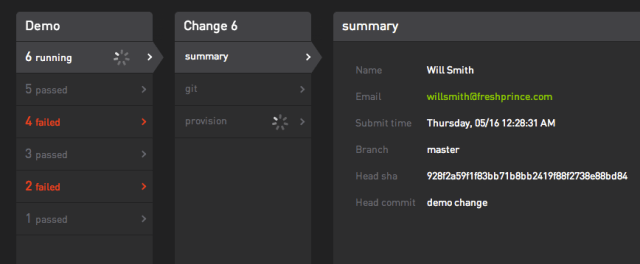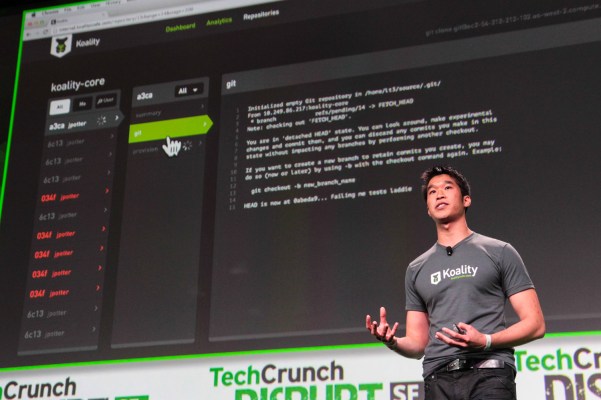Launching at Disrupt SF, Koality is a development tool that fills an important gap for engineering teams. It’s a seamless server-side application that sits between your startup’s repository and your engineers. Instead of submitting code to your repository, you push changes to Koality. The application will then run test suites before submitting to the repository, effectively ending broken builds and countless wasted hours.
“We all worked in software companies, and the most important pain point was broken builds,” co-founder and CEO Jonathan Chu told me in a phone interview before Disrupt. “It happens all the time and it was the most painful thing in our work. If you were working on the same code, you had no choice but to stop working until it was fixed” he continued.
Even though Koality is a very specific tool, it could greatly improve the overall productivity of a startup in two ways. There will never be a broken build again, and testing suites are much faster when you use Koality.
Here’s how it works: Every time a commit fails a test, a notification will be sent to the engineer telling him that something is wrong with his or her code. This way, the engineer has the opportunity to fix the bug before it gets into the repository.
Moreover, you don’t need to run painfully long tests on your computer anymore. You can push your code and shut down your computer. Koality parallelizes the tests as well, greatly improving performances. “When it runs your tests, it spins out replicas of your environment,” Chu said. He gave me a great example of a well-known startup that uses Koality already.
“This company parallelizes its environment 30 times, making it 30 times faster,” Chu said. “It had a similar system internally, so it was really excited that somebody else was doing pre-push test suites and that it was even better,” he continued.

While Chu suspects that Facebook and Google have a very sophisticated testing process and internal environment, many growing companies don’t have the right tool and don’t have the resources to build it internally. That’s where Koality is useful. So far, most of the teams already using Koality have more than 25 engineers. Dropbox is one of them.
Koality supports Git and Mercurial, and runs on Unix-like systems. “Your code doesn’t have to leave your firewall,” Chu said. If you prefer, you can run it on Amazon Web Services. After the setup process, engineers can use your version control client the same way you would.
The team of five started a year ago in the StartX program and has received $1.65 million in funding so far from FF Angel, Webb Investment Network, Uj Ventures, Index Ventures and others. The two founders used to work at Palantir where broken builds happened every day. The company is still figuring out how much the product will cost, but you can expect a per-seat license with a free tier.
Question & Answers
Judges: Mike Abbott (Kleiner Perkins, Caufield & Byers), Ali Partovi (Angel investor), Jess Lee (Polyvore), Gentry Underwood (Mailbox)
Q: Are you giving this tool to companies or individuals?
A: Our focus is on growing startups. Most of the teams that use Koality have more than 15 people.
Q: Market size and business model. How do you envision pricing?
A: On average it’s about $30 per month per seat. But it’s going to be cheaper for little teams and more expensive for bigger companies. Testing suites is just the first step, the low-hanging fruit. We can do bug tracking or other tools.
Q: How long it takes to set up?
A: It depends on the company. It’s simple. It should be a couple of hours, it can take a day.

